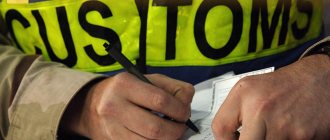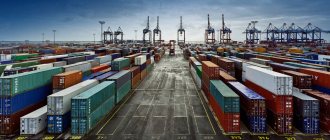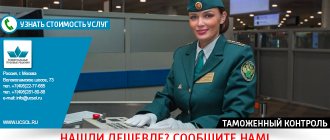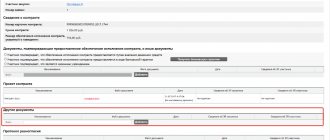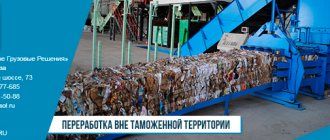Thanks to analytical and operational work, based on the results of customs inspections (hereinafter - CI), customs authorities (hereinafter - TO) collect payments from participants in foreign economic transactions who do not comply with the laws. In light of the expansion of the competencies of customs authorities, the issue of protecting the rights of legal entities and individuals during customs control is becoming increasingly relevant.
Despite the simplification of customs procedures, customs clearance after the release of goods has become a promising area of activity for customs clearance, ensuring the flow of funds into the federal budget. In this article we will look at what a cameral TP is.
Governing legislation
Desk customs inspection as a legal category was introduced by the Customs Code of the Customs Union (CU CU), which came into force on July 6, 2010 and began to operate in the common customs territory of Russia, Belarus and Kazakhstan. Due to the fact that the CU has become a structure within a larger interstate association - the EAEU, which several more states have joined, this code is planned to become a new document, the jurisdiction of which will extend to all EAEU countries.
For more information about the establishment of a new structure, the EAEU, on the basis of the Customs Union, read the article “Since 2015, the Eurasian Economic Union has been operating instead of the Customs Union .
Thus, on December 18, 2014, the draft EAEU Customs Code was sent for consideration to the governments of states that were at that time members of the Customs Union and the Common Economic Space (since 2015 - the EAEU).
It was initially assumed that the entry into force of the new EAEU Labor Code would occur on 07/01/2017 (agreement on the EAEU Labor Code dated 04/11/2017). But subsequently, the Eurasian Economic Commission (EAC) announced the postponement of this deadline to 01/01/2018.
The new Customs Code (EAEU Customs Code) provides for:
- simplification of customs procedures for business;
- transfer of a number of powers to the EEC level;
- use of modern information technologies (rejection of paper declarations and the need to submit a package of accompanying documents);
- minimizing physical contact between foreign trade participants and officials, etc.
But while the new Customs Code of the EAEU has not entered into force, the current source of law regulating the procedure of desk customs inspection is the Customs Code of the Customs Union (as amended on 05/08/2015) (annex to the Agreement on the Labor Code of the Customs Union, adopted by the decision of the Interstate Council of the EAEU at the level of heads of state dated November 27, 2009). The main provisions related to the procedure under consideration are contained in Chapter. 19 TK TS.
What is a desk check at customs?
The procedure under consideration involves the study and analysis of data contained in declarations and other documents available to the persons being inspected, information from the controlling structures of the states included in the Customs Union, as well as other documents and data held by customs authorities on the activities of the relevant persons (p 1, Article 131 of the Labor Code of the Customs Union).
A desk inspection at customs is carried out by the relevant authorities at their location, without organizing a visit to the person subject to inspection (this, in particular, is the difference between this type of inspection and an on-site inspection), and also without issuing documents confirming the purpose of this procedure (clause 2 Article 131 of the Labor Code of the Customs Union).
Desk checks at customs can be carried out at any frequency (clause 3 of Article 131 of the Customs Code of the Customs Union).
Find out how legislators plan to reduce the time frame for desk tax audits.
Customs clearance timeframes
The standard customs clearance procedure lasts from one to three days. Customs clearance may be delayed due to:
- lack of permitting documents from authorized bodies;
- financial disputes between organizations handling cargo;
- errors when filling out or drafting documents presented to customs officials;
- insufficient information about the delivery from the customs point of view (then it sends additional requests to the declarant and he should respond immediately).
In different countries, the duration of customs clearance, the number of required documents and the amount of payments vary. For example, if customs clearance of imported goods in Singapore takes a maximum of four days, then in Uzbekistan it can take up to three months.
Rights of customs officers during inspection
In the provisions of Art. 134 of the Customs Code of the Customs Union, the following rights are recorded for customs officers participating in the inspections in question:
- demand from persons subject to inspection commercial, transport, as well as sources related to accounting and reporting and other information related to the goods being inspected at customs;
- require persons subject to inspection to submit reports for customs control purposes;
- require from credit institutions (including banks) information reflecting the movement of financial funds in the accounts of legal entities that are necessary as part of the verification procedure, including those that may be bank secrets;
- request documents and information from tax authorities and other departments, including those that are legally protected secrets in accordance with the provisions of the sources of law adopted in the CU member states;
- send requests to other states to obtain information necessary for a full inspection;
- gain access to the facilities of organizations in respect of which a desk customs inspection is being carried out, subject to the presentation of instructions and other decisions relating to customs inspections and service certificates;
- seal the premises where the goods are located;
- perform other actions that are provided for by the laws of the Customs Union and the states included in the Customs Union.
Outbound and oncoming
The right of customs officers to conduct counter on-site customs inspections deserves special attention. This institute was implemented by customs officers from the sphere of tax legal relations. As a rule, the need for such audits arises when customs officers check information and information from counterparties involved in operations on goods for which an on-site (main) inspection is carried out.
Returning to the procedure for conducting an on-site inspection, it is worth noting that the period for conducting it is two months. However, it can be extended for another month by decision of customs. In addition, if it is necessary to conduct a counter inspection, examination, or send requests to the customs services of the EEC member states, the on-site inspection may be suspended for up to nine months.
The start date of the on-site inspection is the day the decision to conduct the audit is delivered to the company representative. The on-site customs inspection is completed by drawing up a report.
Responsibilities of customs officers during desk checks
Customs department employees who conduct desk customs inspections are obliged (in accordance with Article 134 of the Customs Code of the Customs Union):
- respect the rights and interests guaranteed by law of those persons who are subject to verification;
- not to allow any harm to be caused to persons subject to inspection by one’s unlawful decisions, actions taken or inactions committed;
- use the information obtained during the inspection only for customs purposes;
- prevent the disclosure of confidential data and information that is a secret if they become known during inspections;
- at the request of the person subject to inspection, provide the necessary information about the provisions of the laws of the states included in the Customs Union, which reflect the procedure for organizing on-site inspections at customs;
- ensure the safety of documentary sources that are received and compiled during inspections, and prevent the disclosure of their contents without the consent of the person subject to inspection, unless otherwise provided by the legislation of the states included in the Customs Union;
- inform the person subject to inspection about his rights and obligations during customs control carried out upon the release of goods, as well as when organizing the necessary examination or when taking various samples of certain goods;
- perform other duties that may be provided for by the provisions of the customs legislation of the Customs Union and the states included in the Customs Union.
Appealing the result of a customs inspection
The customs inspection ends with the execution of an act in which the decisions of the customs authority are formalized:
- on the issue of adjusting the customs value of imported or exported goods
- regarding the country of origin of goods
- by product classification
- on the need to make changes to the customs declaration
- other decisions of customs authorities
All these consequences significantly aggravate the position of a participant in foreign economic activity. If they were issued illegally, or if the customs authority did not take into account any significant circumstances when making a decision, the act of the customs authority is subject to appeal.
USEFUL : keep in mind that often challenging the results of a customs inspection is aimed at reducing the administrative fine, rather than proving the innocence of the violator, read about this at the link, and also watch the video:
As practice shows, the largest number of disputes is associated with an unfounded decision on CCC. It should be noted that the customs authorities took into account the practice of challenging decisions to change the CTS, and introduced a procedure for departmental control.
It is also possible to challenge other decisions:
- To court
- Pre-trial, through a complaint against the decision of the customs authority, it is submitted to a higher authority through customs.
The deadline for filing a complaint is 3 months. Based on the results of the complaint, the customs authority makes a decision to refuse to satisfy it or to suspend the relevant procedures.
The court decision in the procedure of appealing the decision of the customs authority contains an instruction to cancel such a decision and apply the corresponding consequences of the cancellation.
Rights of audited organizations
In the provisions of Art. 135 of the Customs Code of the Customs Union establishes the rights of persons subject to desk customs inspection:
- the right to request from customs authorities information regarding the provisions of the laws of the states included in the Customs Union, which determine the procedure for conducting relevant checks;
- the right to provide all documents and information confirming, firstly, the fact of release of goods, and secondly, compliance with the requirements of the customs laws of the Customs Union and the legislation of the states included in the Customs Union;
- the right to appeal decisions, actions taken or inactions of customs officials in accordance with the procedure established by the laws of the states that are members of the Customs Union;
- the right to use other rights that are provided for by the legislation of the Customs Union and the state that is part of the Customs Union.
Responsibilities of persons subject to desk inspection
In the provisions of Art. 135 of the Customs Code of the Customs Union also fixes the responsibilities of persons subject to customs inspection:
- presentation of goods that are subject to customs inspection;
- submission of information and documents within the established time frame at the request of customs officials (regardless of the medium on which they are located);
- placing a mark on receipt of the document confirming the inspection on the original of the relevant document;
- submission to the inspection persons of the customs department of a translation of the sources necessary for inspection purposes, if necessary, into the official language of the country included in the Customs Union;
- determination of the circle of persons who are responsible for providing information to customs officers carrying out the inspection no later than 2 days from the date of presentation of the document on the inspection;
- fulfillment of other duties provided for by the laws of the Customs Union and the laws of the countries that are part of the Customs Union.
Providing the necessary sources and information for customs checks
Provisions of Art. 136 of the Customs Code of the Customs Union regulate the procedure for providing documents and information for the purposes of conducting desk customs inspections.
Thus, tax structures and other departments of the states that are members of the Customs Union undertake to provide the customs authorities with the necessary sources and information regarding the registration of legal entities, tax payments, information that is secret, accounting reports - subject to the requirements of the laws of the states that are members of the Customs Union, on protection of the corresponding secret (clause 1 of article 136 of the Labor Code of the Customs Union).
Credit and financial organizations of the states that are members of the Customs Union must provide, at the request of customs, sources and information that relate to the movement of financial funds through the accounts of legal entities and are necessary for a full inspection at customs, including those that are bank secrecy, in accordance with the laws of the states that are members of the Customs Union. in the Customs Union (clause 2 of Article 136 of the Labor Code of the Customs Union).
We will discuss in this article whether the disclosure of information constituting bank secrecy is a criminal offense.
Order of conduct
The check is regulated by Art. 332 Labor Code of the EAEU and Art. 228 of Law No. 289-FZ. Below we will look at the whole process step by step.
Preparatory stage
Desk TA is carried out on the basis of study and analysis of information contained in:
- customs declarations;
- commercial, transport and other documents submitted by the DP when performing customs operations or at the request of the TO;
- documents and information from government bodies of the EAEU countries;
- other documents and information available at customs and relating to submarines (clause 1 of Article 332 of the EAEU Labor Code).
Main stage
Desk TP is appointed by the head or deputy head of the technical department who conducts the TP.
The period of cameral TP does not exceed 90 calendar days from the date of sending the notification of TP to the DP. The specified period does not include the time between the date the DP sends a request to provide information and the date it is received by the TO.
Request for information and documents
Office TP is extended by 120 calendar days if necessary:
- carrying out customs examination;
- forwarding claims to third parties (Article 335 of the EAEU Labor Code)
- sending requests, demands, instructions: in accordance with clause 1 of Art. 337, paragraph 7 of Art. 340, paragraph 7, art. 371, paragraphs. 3 p. 1 art. 335 Labor Code of the EAEU and Art. 240, 241, 242 of Law No. 289-FZ; to the competent authority of another EAEU state or a country outside the EAEU; in the TO of other EAEU states in accordance with Art. 373 Labor Code of the EAEU.
Reference. A one-time extension is allowed within the framework of one office TP, approved by the head or deputy head of the TO conducting the TP, with notification of the DP about the period and reason for the extension.
The final stage
The date of completion of the TP is considered to be the date of drawing up the TP act in electronic form or in two copies on paper. The report is approved by the head or deputy head of the maintenance department who conducted the inspection no later than three working days from the date of its preparation.
Conclusions based on the results of the desk TC must also contain information on the estimated amounts of duties to be accrued and paid.
The DP, no later than 15 working days from the date of receipt of the TC act, has the right to submit to the TO in writing objections to the TC act as a whole or to its individual provisions, as well as information about the absence of objections.
If objections to the TP act are submitted or sent by the DP after 15 working days or when sent by registered mail after the sixth working day from the day following the day of the deadline for submitting objections, such objections are not taken into account when making decisions based on the TP results and are transferred to the TP that carried out TP, to a higher TO to consider the issue of departmental control in accordance with Art. 263 of Law No. 289-FZ.
According to the TC act, if there are grounds provided for by the EAEU Labor Code and Art. 218 of Law No. 289-FZ, the TO makes decisions in the field of customs affairs, except for cases when, in order to confirm the validity of the arguments set out in the objections to the TC act, a new TC is appointed.
Results
The procedure for conducting a desk customs inspection is described in Chapter. 19 of the Customs Code of the Customs Union. It is planned that from 2018, instead of this document, a new document will be in force - the EAEU Customs Code.
The inspection is carried out by customs authorities at any frequency without visiting the person being inspected, and a decision (instruction) is not required to begin it.
During the inspection, information from customs declarations and other documents related to customs procedures is studied and analyzed.
You can find more complete information on the topic in ConsultantPlus. Free trial access to the system for 2 days.
Assistance from a lawyer in the customs inspection procedure
The assistance of our customs lawyer during customs inspection may be needed both at the stage of preparing the documents being inspected for inspection, and at the stage of interaction with the customs authority during various control procedures.
Our customs lawyer (customs lawyer) will help you, you just need to sign up for a consultation and start working together to solve the problem. Call now!
